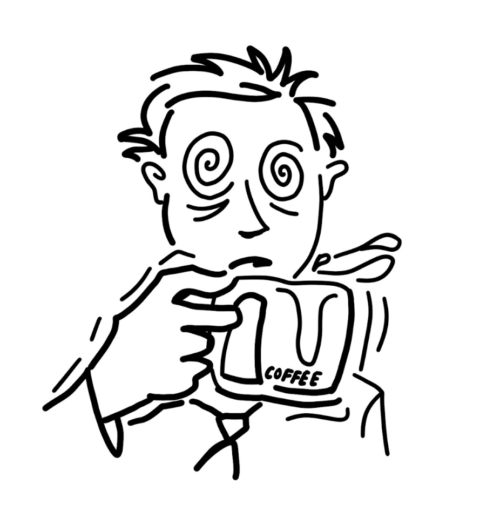There’s a rainbow Starbucks tumbler that sits on the corner of my bookshelf in my dorm. In high school, I brought this cup to school every day, disguising the can of Celsisus inside. The notion of parading the exposed can used to induce a peculiar embarrassment within me. But within the hallowed halls of Harvard, I now harbor little shame or fear as I sit in class, flanked by a cup of coffee on one side and a can of Celsius on the other.
I’m the first to admit that I can’t imagine my days without caffeine. Yet even with every person you see sitting next to you already on their fourth cup of coffee, it’s easy to forget that the drink might be doing more harm than good.
It’s no secret that caffeine addictions are college students’ way of managing academic stress and pressure. Need a place to study? Let’s go sit at a coffee shop and try a new latte flavor. Need a late night library session? Let’s get a Red Bull and hit Lamont. As a college student, the appeal of caffeine is transcendent: sip some coffee or crack open an energy drink, gain an extra boost, and obtain a few more hours of productivity. College campuses around the country have not only normalized absurd caffeine intake, but also romanticized it—college students have found a way to transform caffeine into a lifestyle.
Every morning, hundreds of Harvard students stop at Blue Bottle, Blank Street, Starbucks, Tatte, or any of the other countless coffee chains in the Square to once again reunite with their most faithful friend: a cup of coffee. Coffee shops nearby, like Blank Street, have even begun to offer coffee subscription services, helping students maximize the amount of caffeine they can afford every day. “Blank Street Regulars” is a membership that gets you discounts on coffee, pastries, merchandise, and more. For $17.99 a week, members can claim any drink for free, redeemable every two hours, for up to 14 drinks per week.
What Harvard and other college students may fail to realize is that caffeine is a drug—the most commonly used drug in the world. Even though consumption of low to moderate doses of caffeine is generally okay, an increasing number of clinical studies are showing that caffeine users easily become dependent on the drug and are unable to reduce consumption, despite knowledge of recurrent health problems associated with its continued use.
Regular caffeine intake has become an urgent health concern for college campuses around the nation. Jack Martin ’26, a sophomore studying Philosophy, described coffee as a typical part of his daily routine, noting how he consumes caffeine “one to two times per day, typically a morning coffee and pre-workout.” “I can’t remember when I wasn’t consuming caffeine regularly,” Martin said.
Undeniably, few things bring college students together the same way coffee does. At Harvard, a group of students has banded together based on their shared affinity (or addiction) for caffeine, forming the Harvard College Caffeine Group, or HCCG. The HCCG totes themselves as Harvard’s premier caffeinated beverage admiration organization, ironically sharing an acronym with Harvard’s premier student-run college consulting group.
There’s a pervasive culture of hustle and bustle here at Harvard, and the realities of a caffeine addiction often get pushed aside in service of this. Students here will go to great lengths to stay awake. Obsessed and absorbed in our manic lifestyles, defined by social overload, intense over-productivity, and suppressive expectations, it is no wonder that we fail to recognize or appreciate whether what we are consuming is at all beneficial to our health. Caffeine often feels like our best friend, emerging to save us from our half-awake state by restoring us to the more alert version of ourselves—but at what cost?
As students find themselves running on two hours of sleep a night, reviewing papers and rewatching lectures, it’s not surprising that many of us turn to caffeine when searching for an extra boost. Maybe it would be naive to assume any better of Harvard students, given the pressures and expectations that follow attending one of the most prestigious schools in the world.
Indy Sports Editor Luke Wagner ’26 makes similar observations about Harvard students in his Independent article, “Harvard’s Quest for Fulfillment,” noting that “Harvard’s student culture perpetuates an environment where personal development is relegated to secondary consideration, a mere footnote in the grand narrative of pre-professional education and GPA maximization.” As Wagner discerns, the abundant academic environment at Harvard unsurprisingly drives students to prioritize their studies and career goals above other aspects of their well-being, including their health and sleep.
Like most things in life, caffeine consumption is alright in moderation. However, it’s important to question the intention behind our behavior. When it’s 2am at Lamont and you’re considering that extra cup of joe, ask yourself, “Is it worth it? Is this the price I’d pay in order to stay locked in?”Rania Jones ’27 (rjones@college.harvard.edu) put Celsius on her 2024 “Outs” list.

